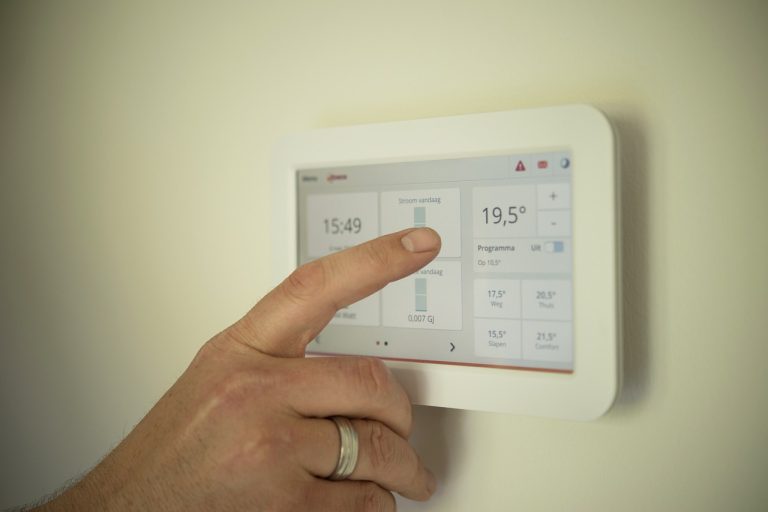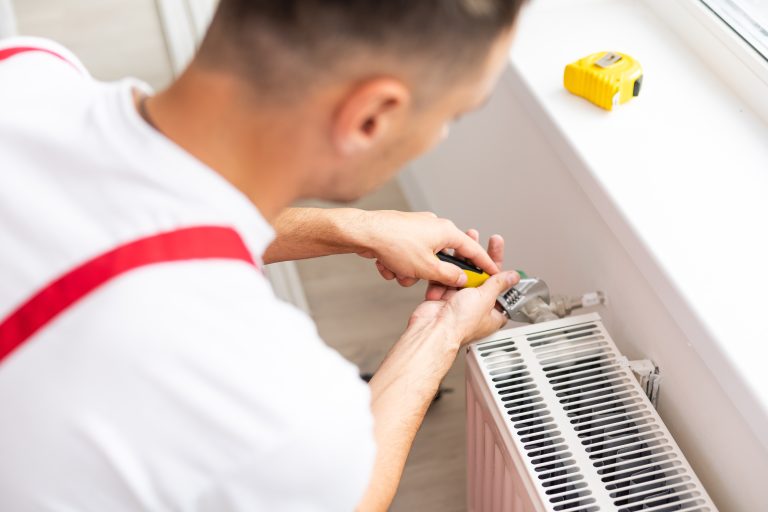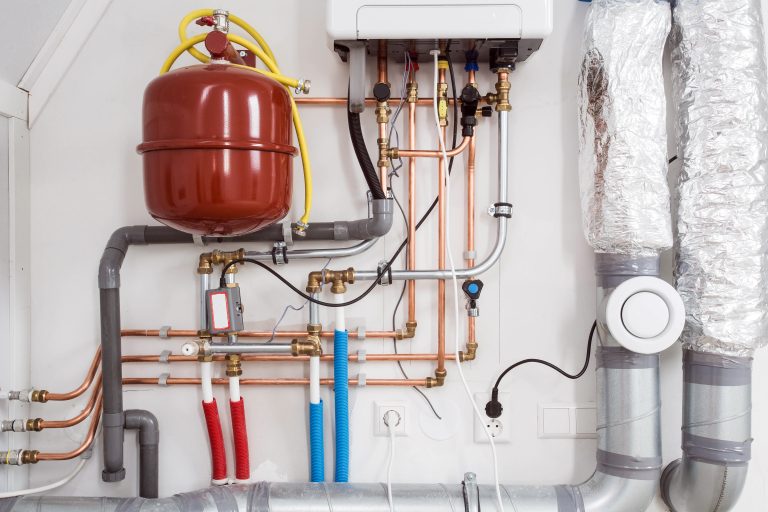How Air Gets Into Your Heating System and How to Remove It
Is your heating system underperforming, with cold spots on radiators, gurgling noises, or fluctuating boiler pressure? These are common signs of air trapped in a heating system, which can significantly impact efficiency and increase energy bills.
But why is there air in my central heating system? Air can enter through leaks, pressure fluctuations, and improper maintenance, creating air bubbles in heating pipes that block water flow. Understanding the causes of air in heating systems and how to remove it through bleeding radiators and heating system venting air techniques can restore optimal performance.
Key Takeaways
- Air can enter central heating systems due to leaks, temperature fluctuations, and improper installation or maintenance.
- Trapped air reduces heating efficiency, leading to cold spots on radiators, increased energy consumption, and boiler strain.
- Bleeding radiators release air bubbles in heating pipes, restoring even heat distribution.
- After bleeding, boiler pressure may drop and must be adjusted using the filling loop.
- Airlocks in heating systems can prevent radiators from heating properly; simple troubleshooting steps can often resolve them.
- Preventive maintenance, such as checking for leaks, monitoring pressure, and balancing radiators, helps minimise heating system air problems.
- Automatic air vents and regular system inspections reduce the risk of recurring air accumulation.
What Causes Air to Enter Your Central Heating System?
Common Sources of Trapped Air in Heating Systems
Air infiltration is a common issue affecting central heating systems, reducing efficiency and uneven heat distribution. But how does air get into a central heating system? Here are the main causes:
- Leaks in the system – Small leaks in pipes, radiators, or valves allow air to enter over time, creating pockets that affect water circulation.
- Installation and maintenance – When a heating system is filled or serviced, air can become trapped in the pipes if not properly vented.
- Pressure fluctuations – Expansion and contraction of water due to temperature changes can create a vacuum effect, pulling in air.
- Faulty components – A malfunctioning expansion vessel or automatic air vent can fail to release excess air, leading to air bubbles in heating pipes.
Signs Your System Has an Airlock or Trapped Air
Recognising the symptoms of air trapped in a heating system before it causes major inefficiencies is important. Some warning signs include:
- Cold spots on radiators: If only the bottom of the radiator is heating up while the top remains cold, air may be blocking the flow.
- Gurgling noises: Air pockets can cause unusual sounds in the pipes and radiators.
- Fluctuating boiler pressure: A sudden pressure drop can indicate air infiltration.
- Reduced heating performance: If your home isn’t warming up as it should, air pockets might be restricting water flow.
- Persistent heating system air problems: If you frequently need to bleed your radiators, air is repeatedly entering the system.
How Air in the System Affects Heating Efficiency

Impact on Radiator Performance
Air in radiators prevents water from circulating properly, leading to inefficient heating. Instead of radiating heat evenly, affected radiators develop cold spots, forcing the boiler to work harder. This increases energy consumption and results in higher heating bills.
Consequences for Boiler and System Longevity
Air trapped in a heating system can cause more than just discomfort. It can lead to:
- Increased wear and tear on the boiler: Since air reduces efficiency, the boiler has to run longer to achieve the desired temperature.
- Corrosion risks: Oxygen in trapped air accelerates corrosion inside pipes and radiators, shortening the system’s lifespan.
- Pressure imbalances: Excessive air pockets can cause heating system troubleshooting for air issues, such as boiler pressure fluctuations or pump failure.
See Related: How to Remove Air Pocket in Cooling System
How to Bleed Radiators to Release Trapped Air
Tools You’ll Need for Bleeding a Radiator
To remove air in radiators, you’ll need:
- A radiator key (or a flathead screwdriver for modern models)
- A small container to catch any water drips
- A towel or cloth to prevent spills
Step-by-Step Guide to Bleeding Radiators
Follow these steps to safely release air bubbles in heating pipes:
- Turn off your heating system and let the radiators cool.
- Locate the bleed valve (usually at the top corner of each radiator).
- Insert the radiator key and slowly turn it counterclockwise. You should hear a hissing sound as trapped air escapes.
- Wait for water to flow out steadily, then tighten the valve back.
- Repeat the process for all radiators in your home.
- Check the boiler pressure and adjust if necessary.
Restoring System Pressure After Bleeding Radiators
Why Central Heating Pressure Drops
When you bleed radiators, some water is released along with the trapped air, causing a drop in boiler pressure. If the pressure falls too low, your heating system may stop working efficiently.
How to Safely Increase Your System’s Pressure
To restore pressure after heating system air removal, follow these steps:
- Locate the filling loop on your boiler.
- Open the valve slowly and allow water to enter the system.
- Monitor the pressure gauge until it reaches the recommended level (typically 1-1.5 bar).
- Close the valve and check for leaks.
How to Remove an Airlock in the Central Heating System
Methods to Remove Airlocks Without Professional Help
An airlock in a heating system can block water flow, leaving radiators cold. To fix this:
- Bleed all radiators, starting with the one closest to the boiler.
- If the issue persists, turn on all hot water taps while simultaneously opening a cold tap for a short time. This can force out air bubbles in heating pipes.
- If the airlock remains, try increasing and decreasing the boiler pressure to push air out.
When to Call a Professional for Airlock Issues
If heating system venting air techniques don’t resolve the issue, it could be due to a major blockage, faulty pump, or hidden leaks. Persistent heating system air problems can cause long-term damage and inefficiencies, making professional intervention necessary.
At ResTemp Solutions, we specialize in diagnosing and resolving airlocks, trapped air, and pressure issues in central heating systems. With over 30 years of experience in heating, ventilation, and air conditioning, we provide expert solutions tailored to domestic and commercial heating systems across Cork. Our team ensures optimal comfort and energy efficiency by identifying underlying system faults and implementing long-lasting fixes.
Preventing Air from Entering Your Heating System in the Future
Regular Maintenance Tips to Avoid Trapped Air
To prevent heating system air problems, follow these maintenance tips:
- Check for leaks in pipes and radiator valves.
- Service your boiler annually to ensure proper air venting.
- Monitor pressure levels regularly to detect early issues.
- Use automatic air vents to continuously expel trapped air.
- Keep radiators balanced for even heat distribution.
Importance of Monitoring Pressure and System Health
Ongoing heating system maintenance for air is key to preventing trapped air and ensuring efficiency. Regular checks help detect issues early, avoiding costly repairs.
See Related: How To Ventilate Your House
FAQs About Air in Central Heating Systems
How Does Air Get Into a Central Heating System?
Air enters through:
- Leaks in pipes or valves
- Initial system filling (if not properly vented)
- Pressure changes causing vacuum suction
- Poor maintenance or faulty air vents
Why Do You Get Air in a Central Heating System?
Despite being a closed system, air can enter through:
- Small leaks that allow oxygen in
- Corrosion reactions releasing gases into the water
- Improper bleeding techniques
What Happens If You Have Air in Your Heating System?
An airlock in a heating system can lead to:
- Cold spots on radiators
- Inefficient heating and higher energy bills
- Gurgling sounds in pipes
- Fluctuating boiler pressure
How Often Do Radiators Need Bleeding?
Bleeding radiators should be done at least once a year. However, if you notice:
- Cold spots
- Gurgling noises
- Low boiler pressure
Then, it’s time to bleed them again.
How Can Air Get Into a Heating System?
Causes of air in heating systems include:
- Leaks and poor sealing
- Temperature-related expansion/contraction
- Improper venting after repairs
How Do I Fix an Airlock in My Central Heating System?
- Turn off the heating, then bleed all radiators.
- Check and adjust boiler pressure if needed.
- Use the tap method to flush out trapped air.
- Call a professional if the airlocks persist.
Conclusion
Addressing heating system air problems promptly ensures better performance, lower energy costs, and longer system life. Regular heating system troubleshooting for air can prevent costly repairs. A well-maintained system operates efficiently and keeps your home comfortably warm.





